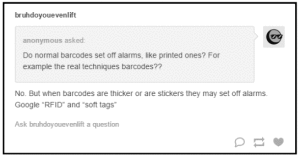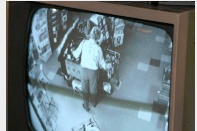 Protecting your business and employees from shoplifters seem to be getting harder. Knowing when and what to do when a shoplifting incident occurs in your store can help prevent employees and customers from getting hurt. Do your employees know who to call? What to do when a shoplifter is taking goods from your store and walking out? Making sure your employees know what do, and how to respond when an incident occurs can help prevent accidents.
Protecting your business and employees from shoplifters seem to be getting harder. Knowing when and what to do when a shoplifting incident occurs in your store can help prevent employees and customers from getting hurt. Do your employees know who to call? What to do when a shoplifter is taking goods from your store and walking out? Making sure your employees know what do, and how to respond when an incident occurs can help prevent accidents.
Follow the links below for more information about this topic.
Spike in shoplifting drives property crime wave in Taos
TAOS — Taos Municipal Court may seem quaint, decorated as it is with landscapes painted by the judge himself, but it’s not sleepy. The court’s docket of shoplifting cases nearly doubled during the last fiscal year to just under 90.
Judge Dickie Chávez says approximately 3 out of 4 shoplifting cases in his court concern the purported theft of alcohol.
The spike in shoplifting cases comes despite the Taos Police Department’s tough approach, arresting rather than citing virtually every suspect apprehended regardless of how small the alleged theft. But it also raises questions about whether law enforcement and courts are the right institutions to address a problem officials say is driven by substance abuse.
‘Operation GroupMe’ was meant to fight shoplifting, enables racial profiling instead
Georgetown has had a shoplifting problem lately, so local citizens turned to group-messaging app GroupMe for help. The Georgetown Business Improvement District partnered with local police to launch “Operation GroupMe” early last year to connect small businesses, police officers, and community leaders in a concerted fight against shoplifting. Instead, it’s become an exercise in racial profiling.
Local police in the Washington, D.C., neighborhood recorded more than 120 thefts in just the last 60 days, according to CBS News. The group-messaging chat room, which comprises 380 members, was meant to help shopkeepers, police, and others alert each other about shoplifters or people who seem suspicious.
In the more than 3,000 messages exchanged about suspicious people in the Operation GroupMe group since January, nearly 70 percent were black, according to a review by the Business Improvement District. This is a particularly startling finding, given that nearly 80 percent of Georgetown’s residents are white.
Police: Helena man bites Capital Sports employee in shoplifting attempt
A 38-year-old Helena man faces a felony robbery charge on accusations he bit a store employee’s hand during an attempted shoplifting.
Dwight Edward Pierson is jailed on $20,000 bond.
Police responded to Capital Sports, 1092 Helena Ave., on Friday after receiving a report that a store employee had detained a suspected shoplifter. Officers noted the employee had two open, bleeding wounds on his right index finger, charging documents say.
The employee told police another worker saw a fishing reel sticking out of Pierson’s pocket while in the store. Pierson, who is on probation, ran from the store, court documents say. An employee grabbed Pierson by his hood and pinned him to the ground.





 eir knowledge to others who may be new to the game. Much like a tenured LP manager taking a green agent under their wings.
eir knowledge to others who may be new to the game. Much like a tenured LP manager taking a green agent under their wings.






